Keresés: %s
Keresés: %s
Justice and Home Affairs Council, Meeting of the Ministers of Home Affairs - 10 June 2022, Luxembourg
The Home Affairs day of the Justice and Home Affairs Council took place in Luxembourg on 10 June 2022, organised by the French Presidency of the Council of the European Union, where Hungary was represented by Ambassador Tibor Stelbaczky.
At the Council meeting, ministers exchanged views on the Overall state of the Schengen area and adopted general approach on the Regulation amending the Schengen Borders Code, the Directive on information exchange and the Prüm II Regulation. The French Presidency presented the progress achieved in the area of asylum and migration, and ministers discussed the way forward. Other issues discussed included the strengthening of cooperation between the competent national authorities in the fight against terrorism and radicalisation, as well as an overview of Member States' efforts to address the refugee and humanitarian situation, as well as the criminal risks caused by the Russian-Ukrainian war. Over lunch, the ministers of interior had an exchange of views on the strengthening of the role of the European Border and Coast Guard Agency (Frontex) in supporting Member States.
In his statement, Ambassador Tibor Stelbaczky stressed that Hungary continues to support the proper functioning of the Schengen area and the guarantee of the right to free movement. We can only accept measures involving internal border controls as a last resort, for a limited period of time, in compliance with the principles of necessity and proportionality. The European asylum reform must aim to prevent illegal migration, as well as the abuses of the asylum system and to ensure the protection of the external borders. We are interested in creating a strong system that is ready to cope with continuous migratory pressure, hybrid attacks and sudden crises. He recalled that since the beginning of the Russian-Ukrainian war, the largest humanitarian operation in the history of our country is ongoing to alleviate the crisis caused by the war. He stressed that the security risks, the burden of the humanitarian crisis, the economic consequences of the conflict and the negative impact of the EU sanctions during the Russian-Ukrainian war are largely borne by the frontline Member States on the EU's eastern borders. Therefore, it is essential to identify additional EU financial resources that could be used to support, in particular the Member States neighbouring Ukraine.
Competitiveness Council, 9-10 June, Luxembourg
The meeting of ministers responsible for competitiveness (industry, single market, research, space) took place in Luxembourg on 9-10 June 2022, where Hungary was represented by Ambassador Gábor Baranyai, Deputy Permanent Representative of Hungary to the EU.
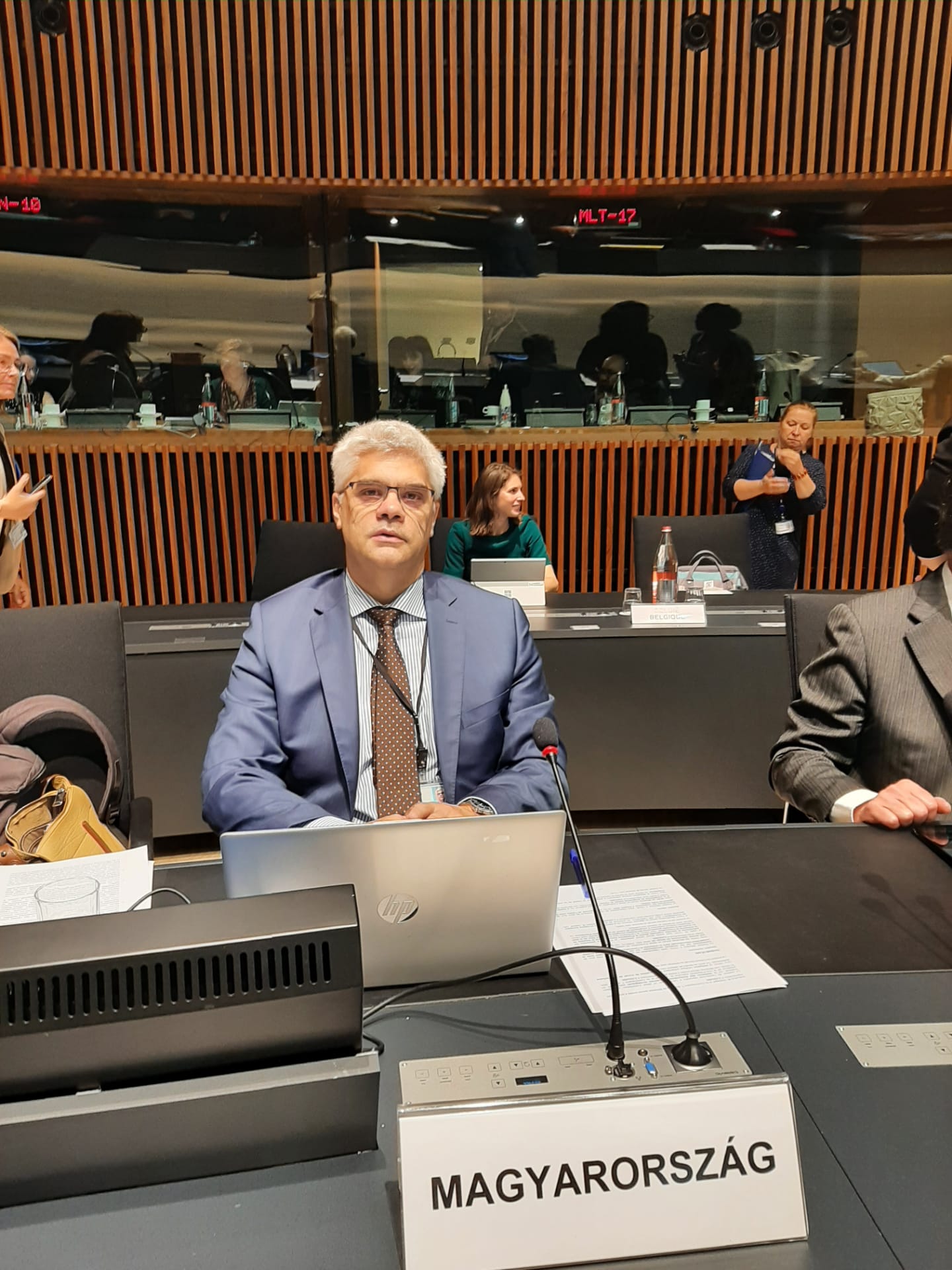
The first, industry and single market related day of the Council began with the approval of a general approach on the Consumer Credit Directive. The proposal aims to ensure a higher level of consumer protection, reduce the current fragmentation of the market and deepen the cross-border market for consumer credit.
The Competitiveness Council then reviewed the progress made so far on the Chips Act and identified the possible direction for future legislative work. This was followed by a policy debate on the resilience of Europe’s strategic industrial ecosystems. During the debate Member States stressed the importance to act on the supply of raw materials, in particular on international partnerships, as raw materials are essential to maintain the momentum of the green and digital transition of the industry. In addition, the role of the circular economy in the supply of raw materials has also been highlighted. Under any other business points, the French Presidency informed Member States about current legislative proposal on the directive empowering consumers for the green transition.
On the second day, in the research section, the ministers adopted three sets of Council conclusions, namely on principles and values for international cooperation in research and innovation, on open science, and on European missions.
Ministers had a policy debate on supporting young researchers in times of crisis. More specifically, they discussed how to coordinate EU action to overcome current challenges faced by researchers and how to help researchers build a sustainable career. Ministers agreed that the COVID epidemic and the war in Ukraine have had a negative impact on the career prospects and progression of researchers, especially young researchers. Germany, the Netherlands, Belgium, Sweden, Hungary and the Czech Republic highlighted that women in particular have been adversely affected by the pandemic, given that they are usually responsible for childcare. They have taken a number of measures to address the impact of the epidemic and the war in Ukraine. They supported EU-level action and the development of career conditions for researchers at European level.
On the last session of the Council, Ministers responsible space discussed the resilience and competitiveness of the EU space programme, provided political guidance for the future developments of the Copernicus programme and for an EU approach to space traffic management.
Hungary continues to guarantee health care for the victims of the war – EPSCO Health Council meeting, 14 June 2022
The EPSCO Council of Health Ministers took place on 14 June 2022 in Luxemburg. On behalf of Hungary, Dr. Péter Takács Secretary of State for Health attended the meeting.
Péter Takács confirmed that Hungary continues to guarantee the necessary humanitarian and health assistance for the victims of the war. In addition to institutions specialized in HIV/AIDS, TBC, oncology, further hospitals have been designated to provide care for refugees. The healthcare system pays special attention to protection of women, mothers and children - they are entitled to wide ranging healthcare services corresponding to their conditions and age.
The ministers held policy debate on the recently proposed regulation on European Health Data Space. As a preliminary position, Hungary indicated readiness to create a common European Framework which leads to a more efficient functioning of health systems.
The Council had an overview of the state of play of joint Covid-19 vaccine procurement bearing in mind that many Member States face surplus challenges. Due to carefully planned procurement policy, Hungary is less affected by this problem, nevertheless we also find it crucial that sufficient shelf-life is guaranteed after the delivery of vaccines.
The European Commission informed the Member States on the implementation of medical devices regulation and Péter Takács called for the necessary legislative and non-legislative measures to ensure safe supply of medical devices.
In the framework of the debate on the EU’s future global health strategy the Hungarian delegation named climate change, zoonotic diseases as priority issued and highlighted the importance of strengthening the leading role of the World Health Organization.
Food security was the main focus at the Agrifish Council in June
Agriculture ministers exchanged views on agri-food market situation, the health and environmental standards of imported goods and the sustainable use of plant production product on the 13th of June in Luxemburg.
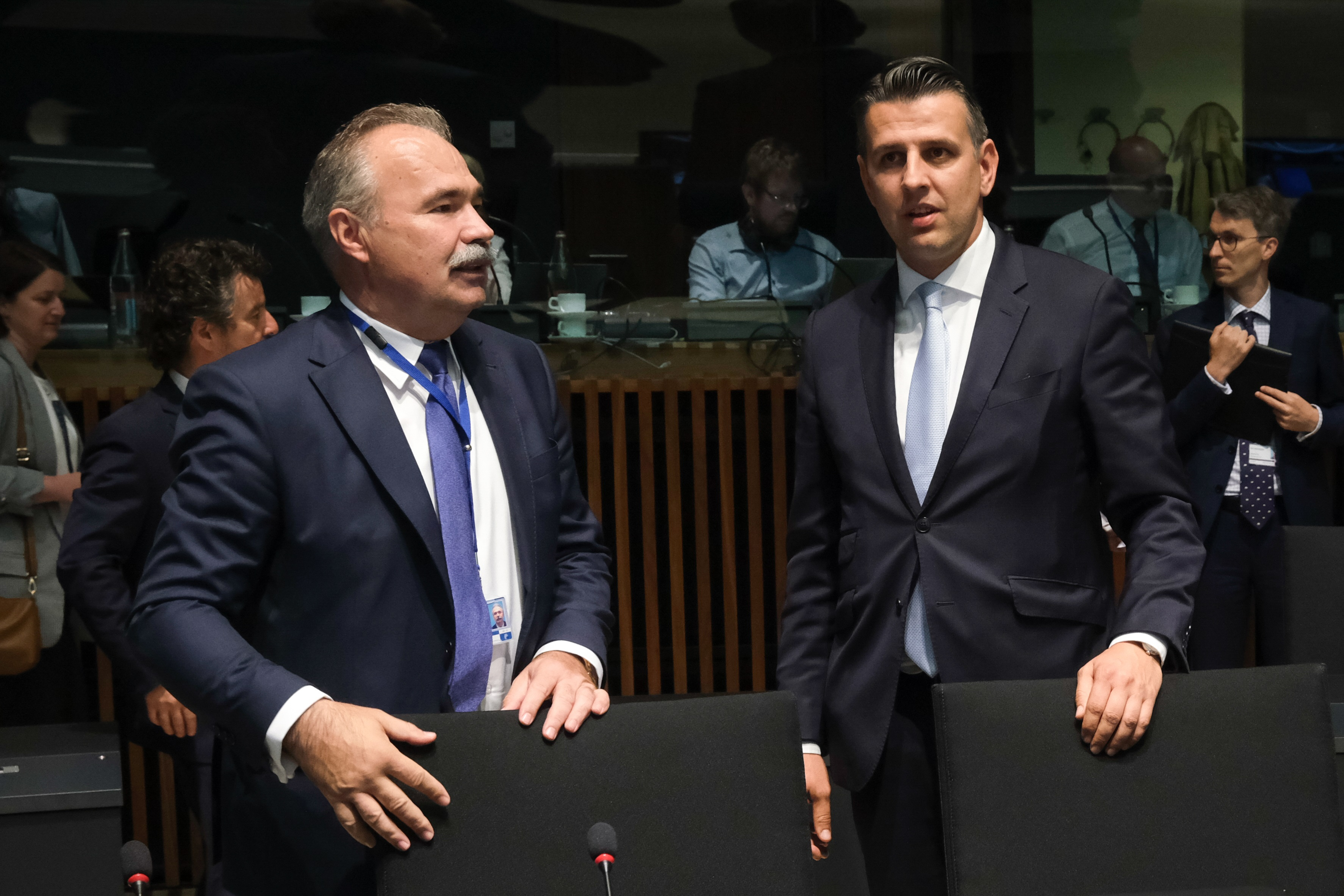
As regards the market situation in the wake of the Russian invasion of Ukraine, Ministers still highlighted the food security as key priority. Minister István Nagy recalled that the EU is net exporter of agricultural products and it is our common responsibility to help third countries. In order to reach that, the EU has to produce more, therefore, the swift adoption of the CAP strategic plans is highly necessary. The Minister highlighted that it is of utmost importance to stabilise agricultural production in the region. Hungary, as a neighbouring country will help Ukraine export its grain products through our country.
The Commission presented its report on EU health and environmental standards of imported agri-food products. Minister István Nagy pointed out that the fight against climate change, the protection of biodiversity and the reduction of pollution is global challenge that can only be tackled effectively on global level. The Minister said that third countries must also play a key role in order to have global impact as regards the shift to sustainability.
As regards the proposal on sustainable pesticide use, Member States pointed out that it is essential to provide appropriate alternative solutions and recalled the importance of food security. Minister István Nagy also highlighted, that the proposal for a new pesticide reduction regulation, must take into consideration the specificities and the different starting points of the Member States.
Further topics were also discussed such as the revision of geographical indications and the current situation of African swine fever.
Benefits and challenges of participation in co-funded partnerships with a thematic focus on co-funded partnerships under Cluster 6: Food, Bioeconomy, Natural Resources, Agriculture and Environment
The National Research, Development and Innovation Office of Hungary (NRDIO) together with the Czech Liaison Office for Education & Research (CZELO), the Polish Science Contact Agency of the Polish Academy of Sciences (PolSCA) and the Slovak Liaison Office for Research and Development (SLORD) organised a conference about the benefits and challenges of co-funded partnerships on 13 June 2022 at the premises of the Hungarian Permanent Representation. The well-attended event was also available for online participants.
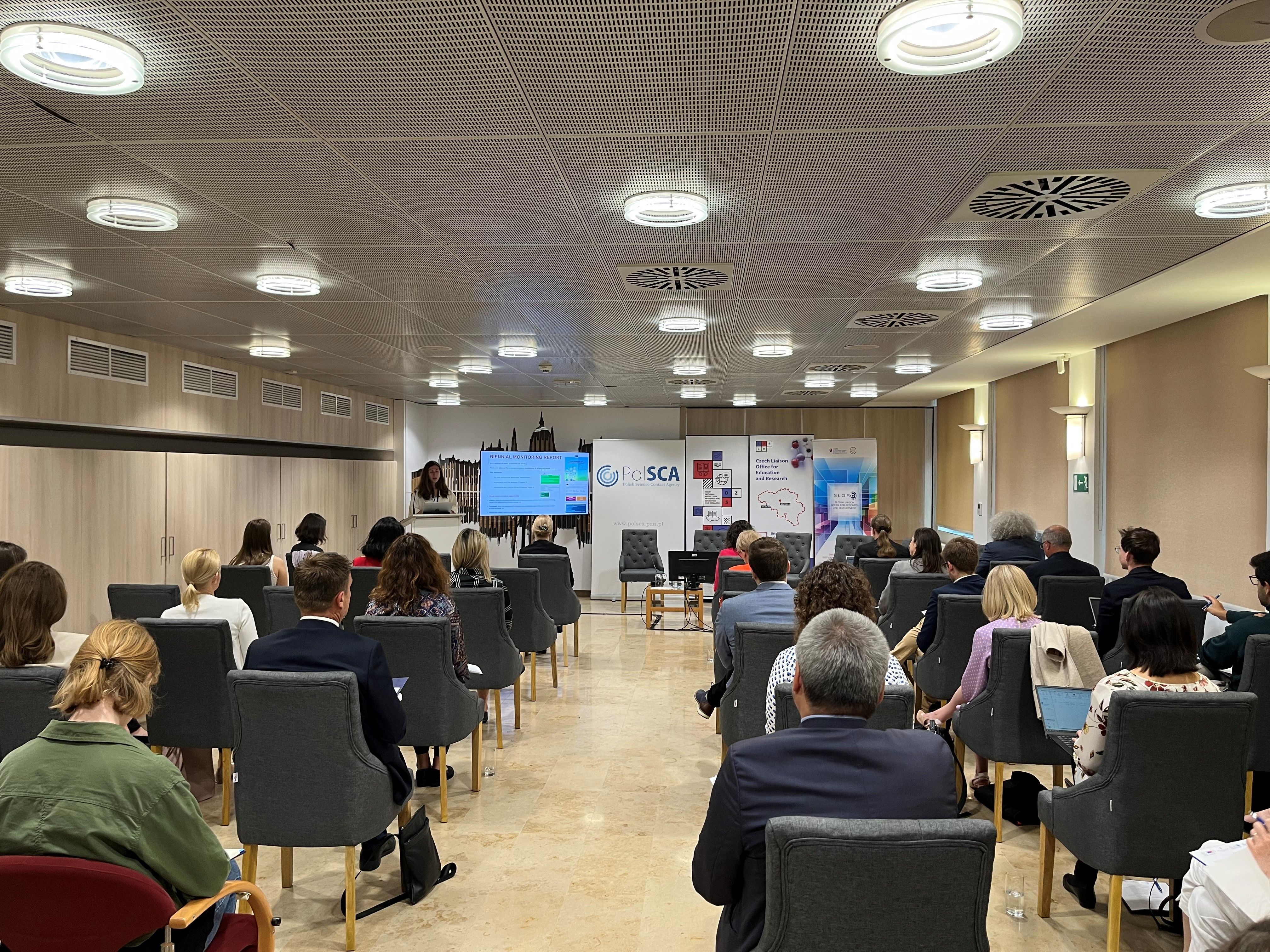
After the welcoming remarks of His Excellency, Gábor Baranyai, the key-note presentation of Maria Leek from the European Commission not only focused on the recently published biannual monitoring report of partnerships but also on the future of the strategic planning process. The policy panel has addressed topics like the added value of participation in partnerships, the difficulties of prioritization, the necessity of synergies, commitment and mirror groups for partnerships on the national level. Ms. Leek reported about the launch of Mutual Learning Exercises in order to help sharing good practices and to find joint solutions for such challenges like the exit strategies of partnerships. As a second key-note, Margareta Olson (European Commission) has presented the strategic research and innovation agenda (SRIA) setting process. The four scientists from the V4 countries have not only presented their scientific achievements linked to partnerships but also highlighted the importance of support staff when understanding and applying for partnership-related calls, the necessity of personal commitment, coordination skills and the need for scientists, who are able and ready to deal with policy documents. In his final remarks, Barna Kovács, Secretary General of the BIOEAST initiative also highlighted the need for support structures and the possible role of BIOEAST working groups in the preparation of partnership SRIAs and national participation.
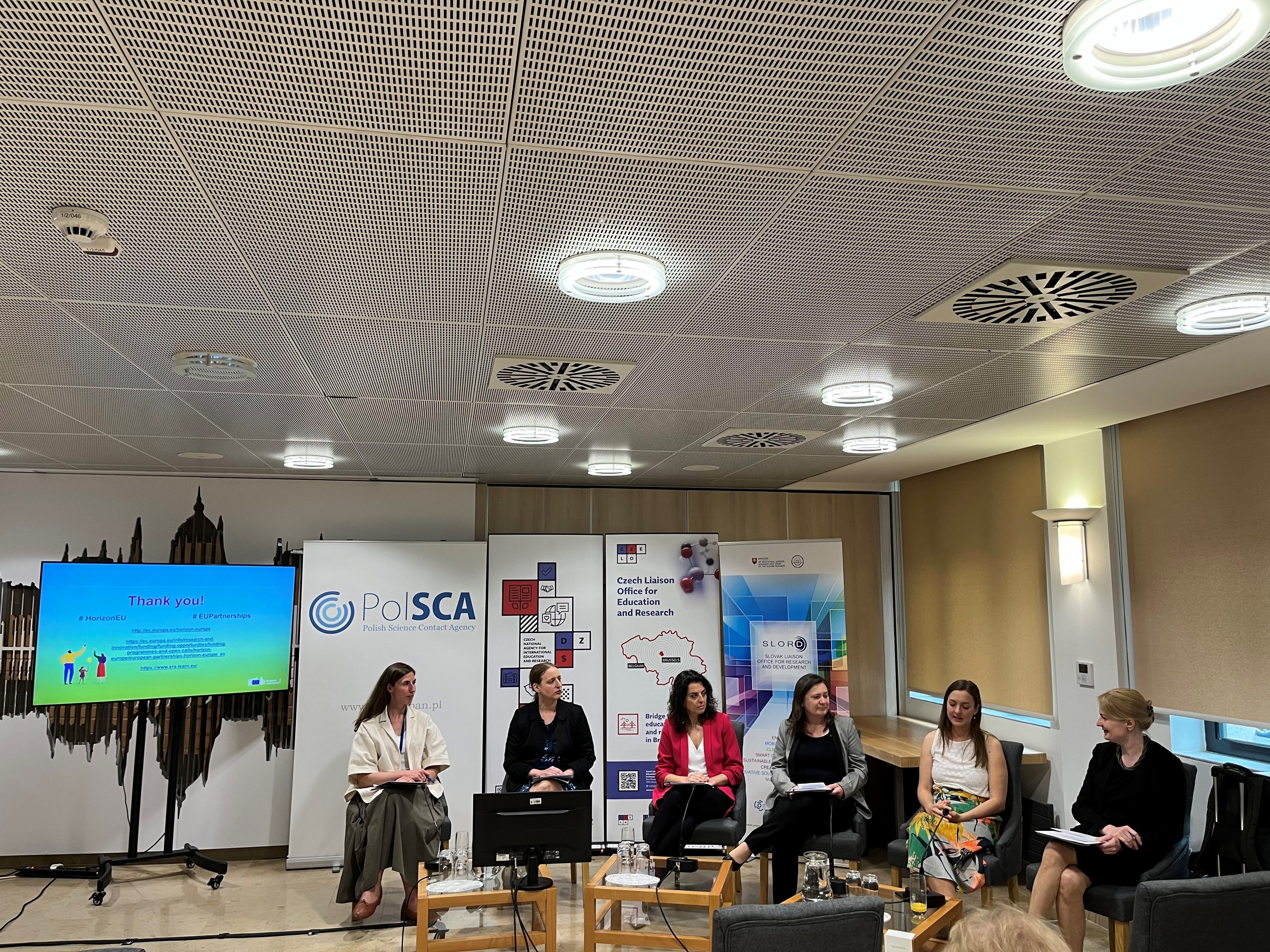
Economic and Financial Affairs Council - Luxembourg, 17 June 2022
The ministers discussed the current economic situtation at the ECOFIN meeting on 17 June in Luxembourg. Rising inflation was at the center of the debate. There was a consensus that coordinated action, with measures to help the most vulnerable households, could provide an appropriate response to the challenges.
Under the legislative agenda, the own resources system of the EU, the anti-money laundering legislative package and the Council directive on ensuring a global minimum level of taxation for multinational groups were discussed. For the time being no agreement has been reached on the global minimum level of taxation, because Hungary could not give it’s approval yet, but is ready to continue the negotiations.
During the non-legislative agenda items, ECOFIN was briefed on the state of play of the RRF implementation and the Council approved the Polish recovery plan. Ministers also supported Croatia's accession to the eurozone, allowing 20 member states to use the single currency from January 2023. Finally, ministers approved the country-specific recommendations made in the context of the European Semester 2022.
Hungary supports Ukraine’s EU candidate status
On Tuesday, President of Ukraine Volodymyr Zelenskyy called Prime Minister Viktor Orbán; during the conversation, the parties spoke about Ukraine’s European intergration, the taking in of war refugees and further areas of Hungarian-Ukrainian cooperation, Bertalan Havasi, the Deputy State Secretary heading the Press Office of the Prime Minister informed the Hungarian news agency MTI.
During the talks, Mr Orbán stressed that Hungary supports the proposal that Ukraine be granted EU member candidate status, and that the bureaucratic obstacles to Ukraine’s actual accession to the EU must be removed within the shortest possible time. The Hungarian Prime Minister informed the Ukrainian head of state that at this week’s EU summit in Brussel he will stand for this position.
Mr Orbán also mentioned that so far Hungary has taken in almost 800,000 Ukrainian refugees, and is ready for further cooperation in the field of energy, the shipment of Ukrainian grain by rail and the reception of even more Ukrainian students.
On behalf of the Ukrainian people, Mr Zelenskyy said thank you for the Hungarian assistance.
source: miniszterelnok.hu/MTI
Environment Council - 28 June 2022, Luxembourg
Following a marathon of negotiations, Ministers adopted general approaches on the climate legislation of the “Fit for 55” package, at the Environment Council in Luxembourg on the 28th June.
Given the strong connection among the proposals, Ministers made their decision on the legislative drafts as a unified package, instead of having a separate decision on each proposal. The compromise adopted at the Environment Council is going to serve as the Council mandate for the trialogues with the European Parliament. The decision comprises the rules on the EU Emission Trading System (EU ETS), the Effort Sharing Regulation (ESR), the carbon sequestration of the land use, land use change and forestry sectors (LULUCF), the CO2 standards for cars and vans and the establishment of the Social Climate Fund.
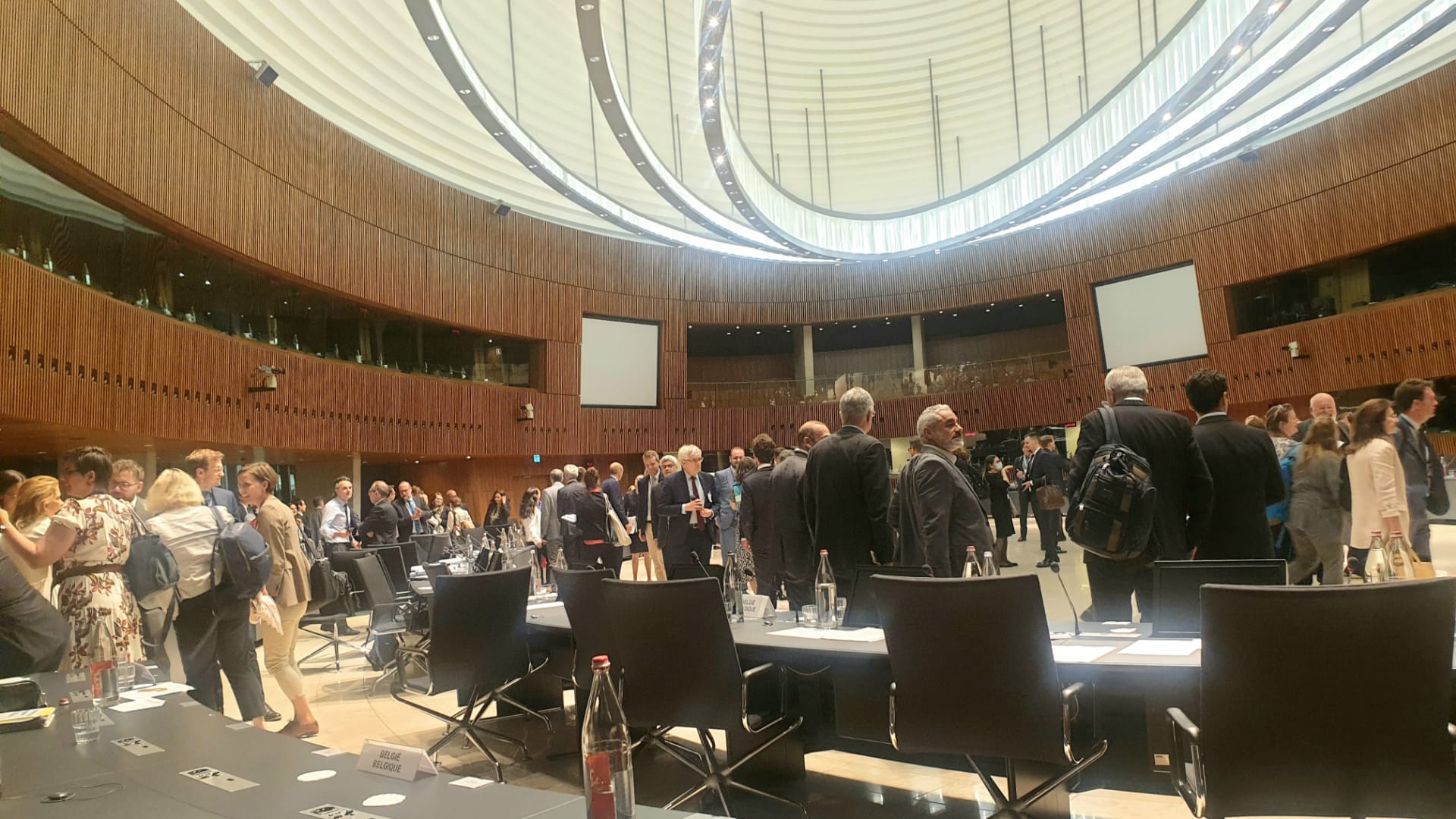
The scope of EU ETS would be extended to building and road transport sectors (BRT ETS). In order to alleviate the negative socio-economic impacts of the BRT ETS, the Social Climate Fund would be established, and the size of the Fund would be set at 59 bn euros. Hungary’s share of the Fund would be 2.5 bn euros. Within the framework of CO2 Cars and Vans, the Ministers supported a zero-emissions mandate for the sale of new vehicles from 2035, but agreed on a 2026 review clause to allow the industry time to prove it can develop alternatives to battery electric vehicles, such as carbon-neutral e-fuels. For Hungary, it remains a priority to prevent that citizens pay for the cost of transition and to reach a balanced and socially just agreement during the trialogues.
Energy Council - 27 June 2022, Luxembourg
At the Energy Council Meeting in Luxemburg, Hungary was represented by Prof. Dr. László Palkovics Minister for Innovation and Industry and by Péter Szijjártó Minister of Foreign Affairs and Trade.
The Council adopted ambitious proposals on the energy efficiency and the renewable energy directive, which will contribute not only to the 55% emission reduction target for 2030, but also to the strengthening of energy security, which is particularly important in the current geopolitical situation. Minister László Palkovics supported the proposals and emphasized the importance of the affordability and accessibility of energy. The Minister emphasized that of the most effective solutions to reach this goal is to increase energy efficiency. Hungary has supported the provisions for reducing energy consumption because "the unused energy is the cheapest and best energy".
With regards to renewable energy sources, he emphasized that the local use of such energy not only contributes to greening the environment and affordability, but also to creating energy independence.
The Council also discussed the European energy situation and outlook in the light of the ongoing was in Ukraine. The ministers have agreed to intensify their efforts to diversify their energy sources, strive to reduce their energy consumption and continue to fill the European gas storages. Minister Szijjártó informed the Council, that Hungary is storing 500 million cubic metres of natural gas for Serbia, which can be retrieved from 1 October 2022. The ministers have also taken note of the European Commission’s report on its activities concerning international energy relations and also welcomed the approval of the EU gas storage regulation.
Circular economy in the Visegrád region – Conference at the Permanent Representation of Hungary
In the framework of the Hungarian V4 Presidency the Permanent Representation of Hungary to the EU organized a half-day conference on circular economy in the Visegrád countries. At the conference we showcased several solutions and initiatives from the region which contributes to the transition to the circular economy in line with the European legislation.
In his opening speech Gábor Baranyai Deputy Permanent Representative of Hungary emphasised that our aim with the event is to present the achievements of the region in the field of circular economy. This topic has gained a lot of attention in the last few years and are supported by numerous legislative proposals from the European Commission. Circular economy and resource efficiency are equally important for the environmental protection, as well as for ensuring competitiveness and security of supply. Ambassador Baranyai highlighted that BIOEAST Initiative is a good example for the regional cooperation in the field of circular economy and bioeconomy.
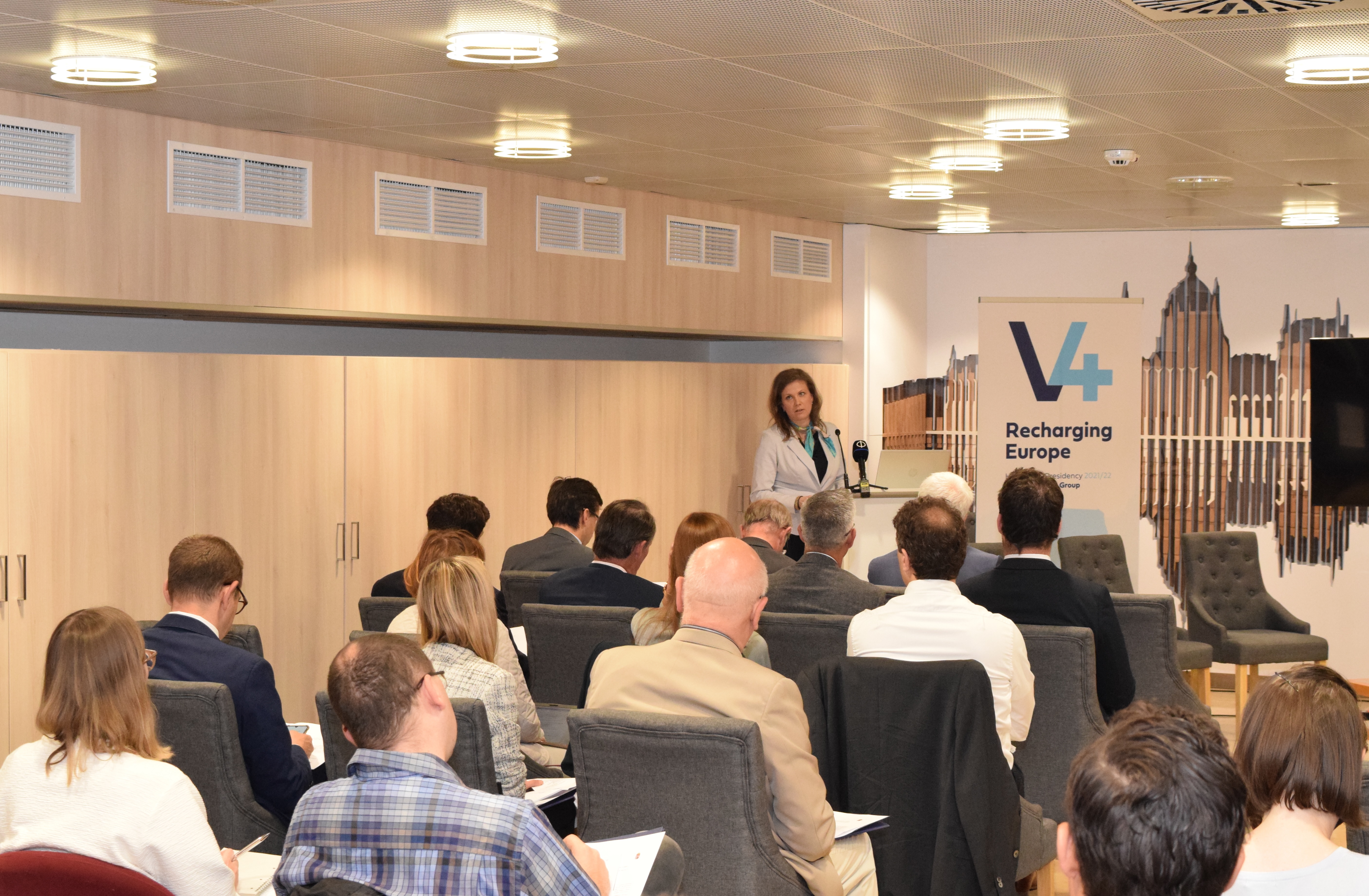
Anikó Raisz Secretary of State for Environment of Hungary underlined that the transition to circular economy is a priority for Hungary and gave an overview about the supporting Hungarian legislation. She stressed that the transition to circular economy contributes to the innovation, creates new jobs and strengthen competitiveness. It also requires coordinated effort from different stakeholders in the society; awareness raising and new approaches are crucial both in production and consumption. The newly established Circular Economy Innovation Platform supports the inclusion of different stakeholders in this process.
Patrick Child Deputy Director General for the Directorate General for Environment of the European Commission informed the audience about the legislative proposals of the European Commission which supports the transition to circular economy. He stressed that it requires new business models from the companies and the European Commission supports this transition via several funds such as LIFE, Horizon Europe etc. The aim is to maintain economic development while respecting the limits of the Earth.
Anett Tóth EU Regulatory Affairs Senior Expert of MOL presented MOL’s endeavours in the field of mechanical and chemical recycling as well as their efforts concerning circular product design.
Martin Basila, founder of the Slovak startup company Sensoneo presented their products which provide digital solutions for several waste management challenges such as monitoring of the amount of waste and setting up deposit refund scheme.
Izabela Ratman-Kłosińska from the Institute for Ecology of Industrial Areas of Poland talked about the Polish-Hungarian collaboration for boosting the environmental technologies verification (ETV) as a circular economy policy support tool.
Zoltán Reng, CEO of Hungarian bioeconomy company, Hungrana presented the company’s innovative solutions for using every part of the corn and produce dozen of products out of it. He emphasized that an improved European legislative framework could encourage companies to turn to circular solutions and produce circular products.
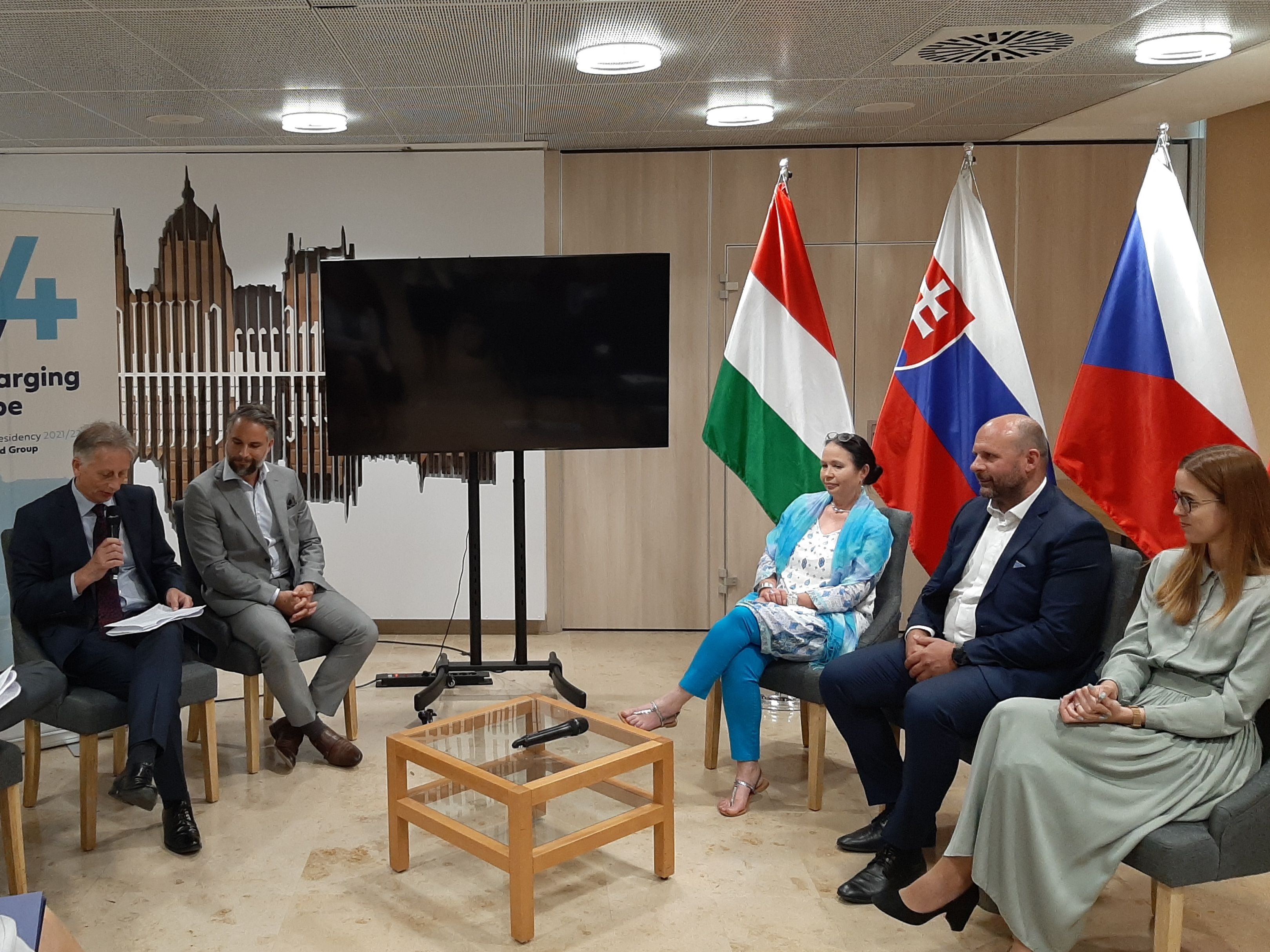
In the panel discussion Peter Handley Head of Unit of DG Grow highlighted that transition to circular economy can help the process of becoming independent from Russian fossil fuels and can secure the supply of rare raw materials. Industrial actors emphasized that ambitious and clear legislative framework would encourage investments, innovation and could facilitate access to market.
In the second section best practices of different stakeholders such as municipalities, hotspots were presented. The municipality of Prague and Veszprém outlined their strategies, awareness raising campaigns and other initiatives which aims to create greener and more sustainable cities.
Agnieszka Sznyk, President of The Institute of Innovation and Responsible Development in Poland presented their projects focusing on companies and on the society in the field of circular transition. In the panel discussion Laura Hetel from EU Mission for Climate Neutral and Smart Cities underlined that the implementation of the European legislation happens at local level therefore the actions of municipalities can provide quick results.
Hungary remains committed to peace and security
On 11 July 2022, the Czech Presidency of the Council of the European Union hosted an informal meeting of interior ministers in Prague (Czech Republic). Hungary was represented by Minister of Interior Sándor Pintér.
The ministers discussed the threats to internal security emerging from the Russian war against Ukraine. Sándor Pintér stressed that more than 830,000 people fleeing from the war have already arrived in Hungary through our eastern borders, and we have been able to provide them with adequate assistance. He emphasized that for the safety of our citizens, we will continue to pay special attention to the prevention of crime at the Hungarian-Ukrainian border. Establishing an efficient information exchange mechanism with Ukraine and Moldova is our common interest.
The ministers also discussed future challenges related to migration. Minister Sándor Pintér stressed that the high number of illegal migrants arriving via the Western Balkan migratory route and their increasingly violent behaviour are a cause for concern. The Hungarian border policing authority has prevented nearly 115,000 attempts of illegal border crossings this year. Migration flows are expected to constantly increase in the near future, and the EU's migration policy must therefore be based on the full protection of the external borders including by the use of physical means. The creation of a border protection force is justified.
In line with the priorities of the Czech Presidency, the ministers reviewed the roadmap for the implementation of the interoperable architecture of EU information systems in the JHA area and exchanged views on ways to combat child sexual abuse.
Economic and Financial Affairs Council - 12 July 2022
At the last ECOFIN meeting before the summer, ministers discussed in detail the economic and financial consequences of Russia's aggression against Ukraine.
The debate focused on short-term and long-term support for Ukraine, but the implementation of sanctions against Russia and the issue of food security were also raised. The ministers also received a report on the status of the implementation of the Recovery and Resilience Building Facility (RRF), and related to this, they discussed the commission's proposal for REPowerEU. Regarding the latter, the two main questions were the funding source of the proposal and the allocation methodology. A significant majority of the member states considered it necessary to amend the Commission's proposal on both issues, so the Czech presidency will continue the intensive work at expert level in order to reach an agreement. Furthermore, ECOFIN unanimously adopted the necessary legislation that gave Croatia the green light for the introduction of the euro on 1 January 2023.
CAP Strategic Plans and food security were in the main focus at the Agrifish Council in July
Agriculture ministers exchanged views on the approval process of CAP Strategic Plans, on market situation, especially following the invasion of Ukraine by Russia, and on the sustainable use of plant production products on the 18th of July in Brussels.
As regards the market situation, Ministers still highlighted food security as key priority. Minister István Nagy recalled that the EU is net exporter of agricultural products, therefore the EU has to produce more. Referring to the invasion of Ukraine, the Minister called for immediate ceasefire to enable agricultural works.
As regards the Common Agricultural Policy, which begins on 1 January 2023, Minister István Nagy expressed his hope for the swift adoption of the CAP Strategic Plans. He highlighted that farmers need greater certainty until the end of summer, when they make planting decisions for the upcoming season in order to comply with the new requirements.
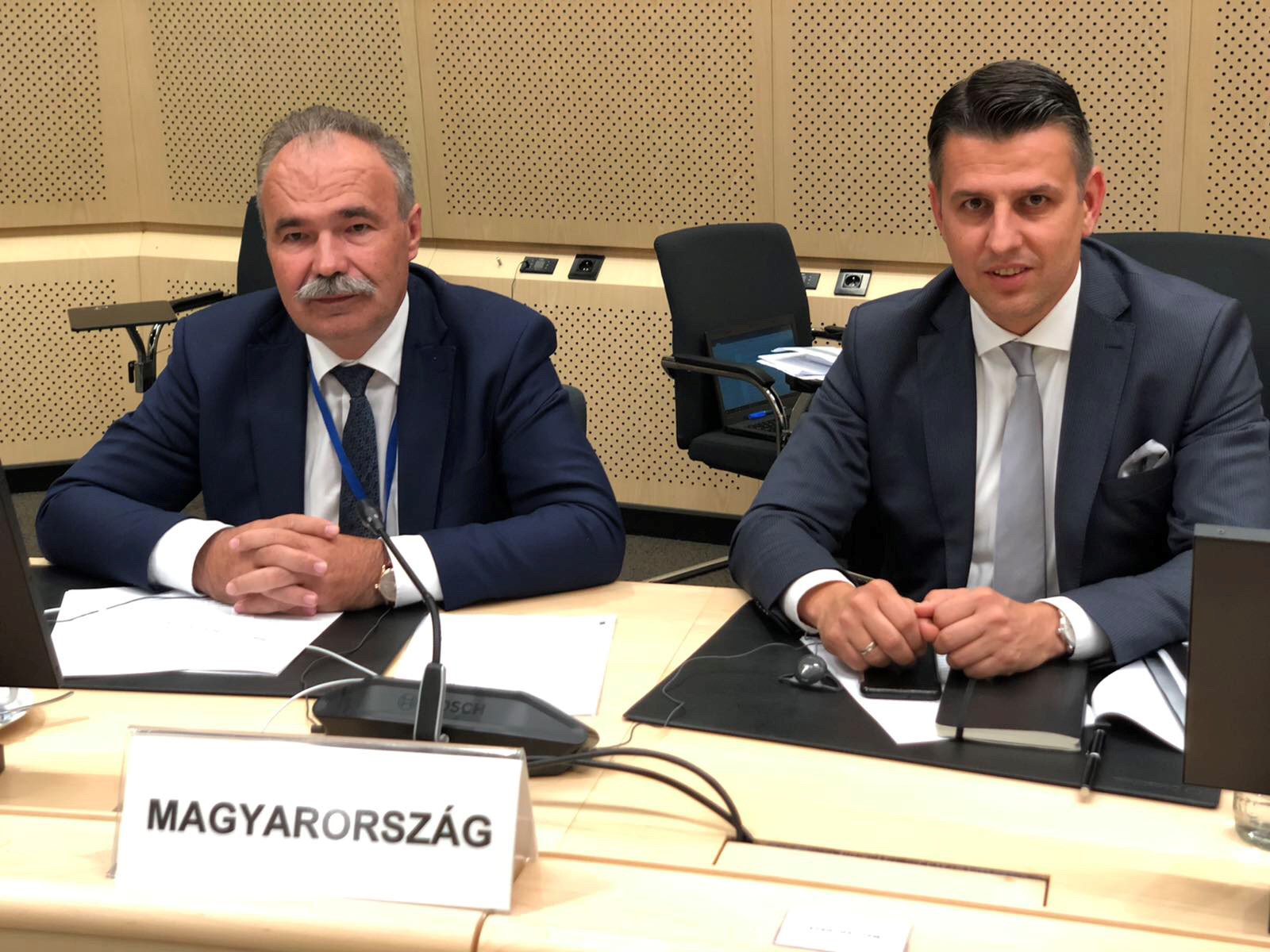
Minister István Nagy informed about the consequences of the serious drought in Hungary, and stressed that farmers need help in the current situation, therefore has presented several proposals to the European Commission.
The Commission presented its draft regulation on the sustainable use of pesticides. Minister István Nagy agreed with the general objectives of the proposal, but emphasized that the different starting points of the Member States and the efforts achieved must be taken into account during the reduction of pesticide use. Hungary could only support a proposal, which ensures the balance between the environmental goals and the competitiveness.
Further topics were also discussed such as the state of play of the regulation on the making available of certain commodities and products associated with deforestation and forest degradation, updating the legislation on the transport of animals in the EU and the sanitary and phytosanitary declaration at the 12th Ministerial Conference of the WTO.
Extraordinary Energy Council
At the Extraordinary Energy Council on 9 September 2022, ministers discussed the necessary and possible emergency measures to mitigate high energy prices and had an exchange of views on the security of supply situation and preparedness in the EU for the winter season.
Member States generally agreed on the need for a swift and coordinated action at EU level to tackle high energy prices, send a strong signal to the market and consumers, therefore the options presented by the Commission on possible the electricity market interventions were supported by most of the Member States, however, these measures were not considered sufficient to decrease very high prices. They called for immediate measures that would reduce the energy bills for consumers before the heating season.
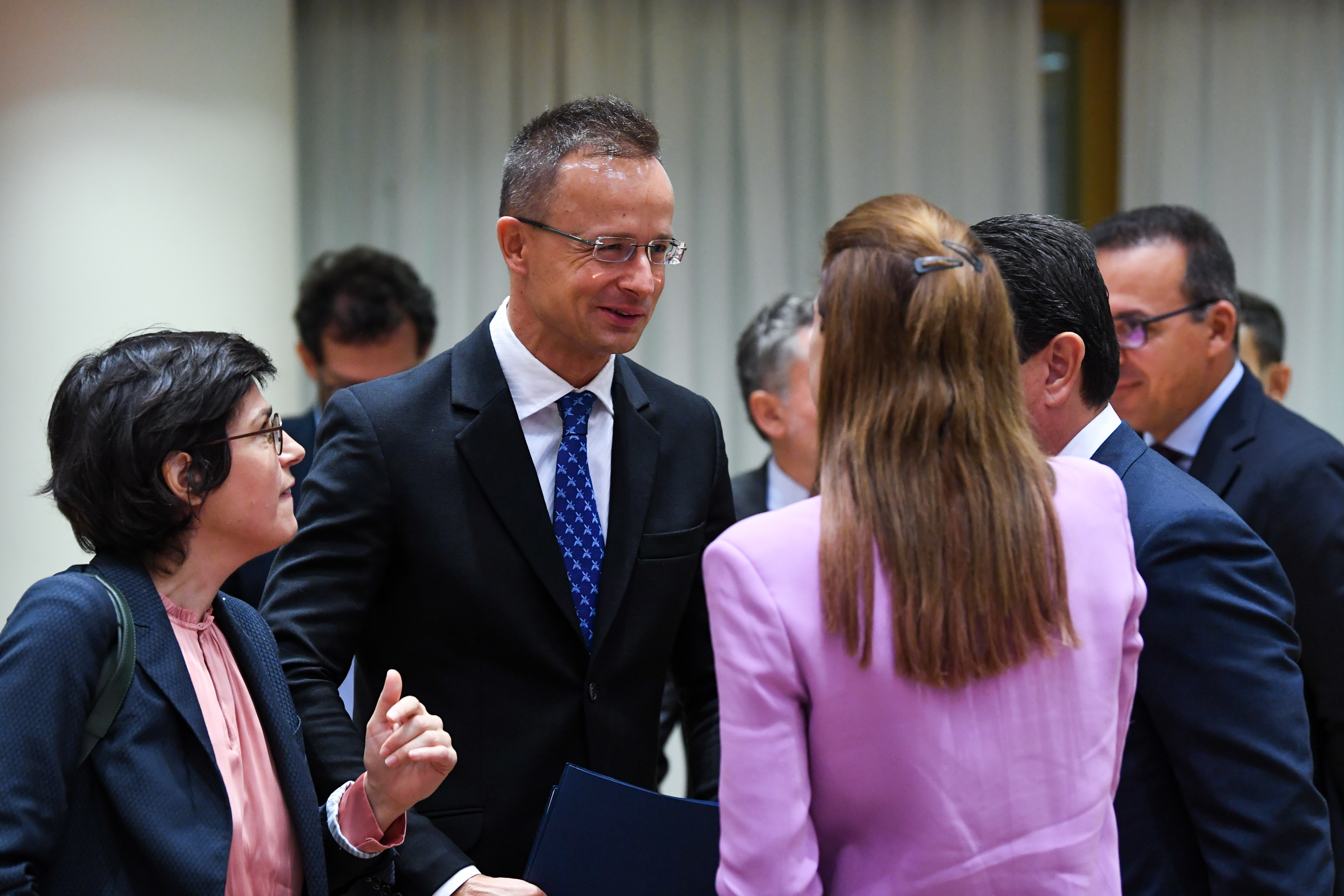
At the meeting of the Energy Council, Hungary was represented by Minister Péter Szijjártó. At the meeting, the Minister stressed that there is currently no physical alternative to Russian gas in the region, and therefore the idea of introducing a price cap solely for Russian pipeline gas is completely contrary to the European and Hungarian interests. On the one hand, this measure would be fatal in Europe’s energy supply, since the price cap only on Russian gas would result in an immediate halt to Russian gas supplies. On the other hand, it would not lead to the lowering of energy prices, but on the contrary, it would increase the price, due to lower gas supply on the market.
With regards to energy security, he added that Hungary was in better situation than other European countries, since in Europe the filling of storage facilities was barely more than 20 % of European consumption, while the Hungarian storage facilities are filled to an equivalent to 38 % of the Hungarian consumption, sufficient for more than 80 days.
The Czech Presidency held its first formal General Affairs Council meeting
Hungary was represented at the General Affairs Council meeting of 20 September 2022 by Minister Judit Varga. The Council was chaired by Mikuláš Bek, Czech Minister of EU Affairs, while the European Commission was represented by Vice-Presidents Maroš Šefčovič and Dubravka Šuica as well as Commissioner Didier Reynders
At the beginning of the meeting, Mikuláš Bek, Czech Minister of EU Affairs briefly outlined his priorities for the Council meeting in a public session format, as regards the areas of the competence of the General Affairs Council, before moving on to the preparation of the European Council meeting due on 20-21 October 2022 based on the annotated draft agenda. During the two-day summit, the heads of state and government will exchange views, inter alia, on the war in Ukraine, energy, economic and foreign relations issues.
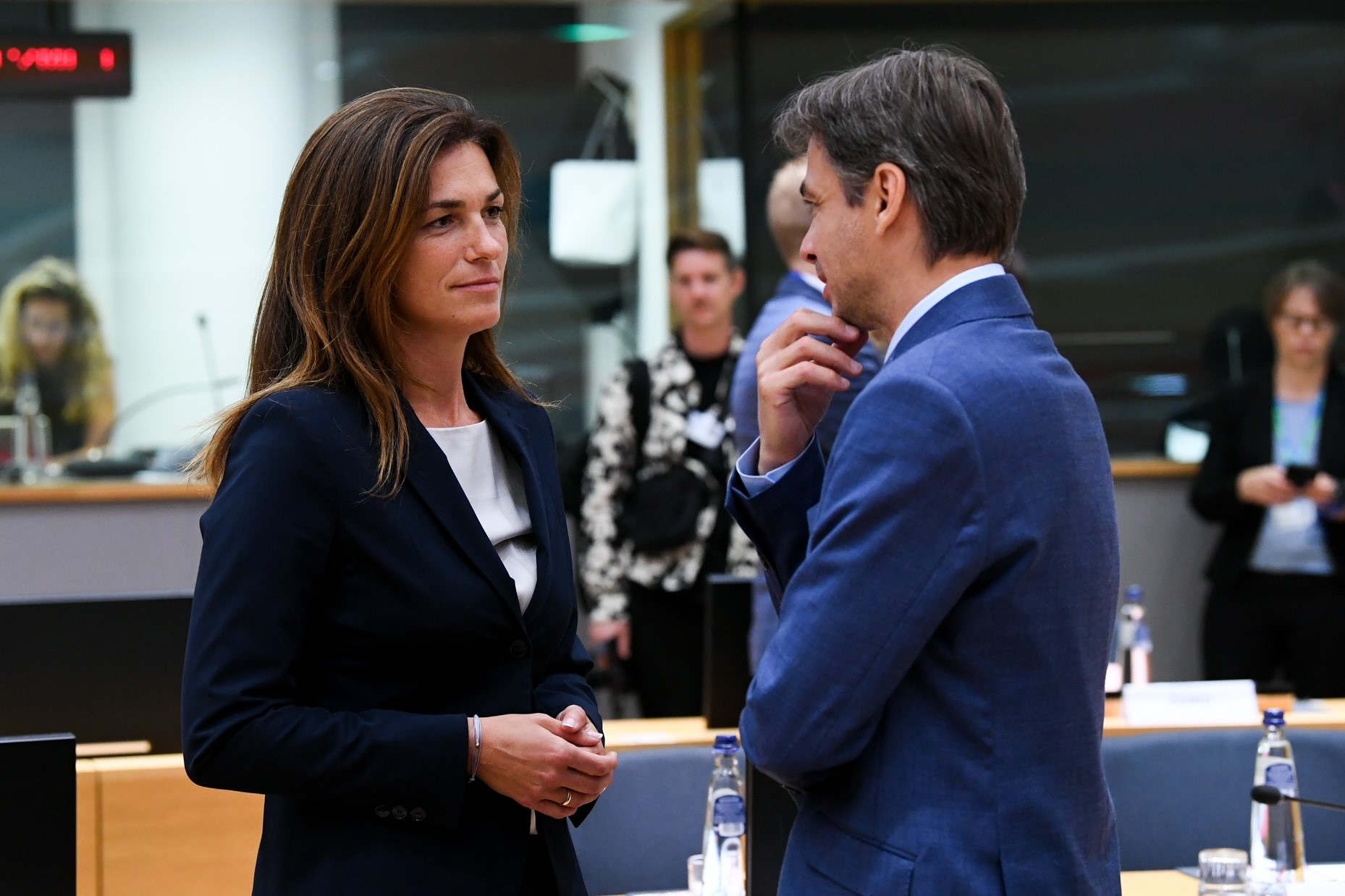
Next on the agenda, ministers reviewed the state of play of relations between the European Union and the United Kingdom, followed by a follow-up to the Future of Europe conference. In the latter debate, the member states' representatives shared their views on the consultation launched in the follow-up to the Conference. Ministers also discussed the letter of intent published alongside the State of the Union address by President Ursula von der Leyen, the proposals contained therein and the European Commission's strategic foresight report, focusing on the alignment of green and digital objectives, considering security concerns in the light of energy dependencies and Russian aggression.
The last item on the agenda was a horizontal debate as part of the annual rule of law dialogue, based on the European Commission's rule of law report published in July this year.
EU’s Solidarity Lanes were in the main focus at the Agrifish Council in September
Agriculture ministers exchanged views on the importance of EU’s Solidarity Lanes, on the emissions rules revision and on the sustainable use of plant production products on the 26th of September in Brussels.
Ministers acknowledged the key importance of the EU’s Solidarity Lanes to maintaining the Ukrainian agri-food export. They pointed out the importance the export through the Black Sea ports. Hungary – as neighbouring country – actively takes part in the implementation of the Solidarity Lane action plan and does its utmost to increase the transport capacity.
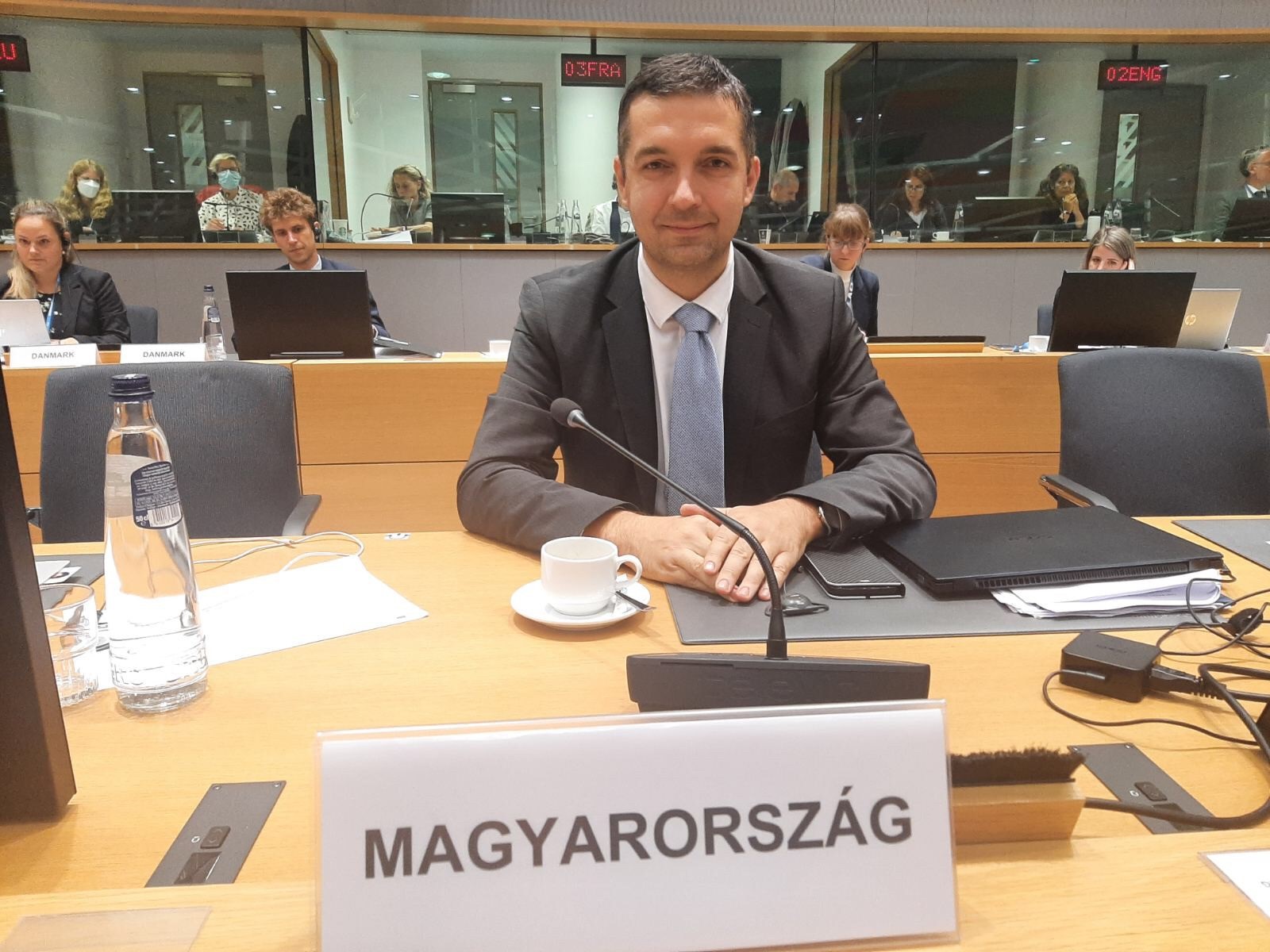
The Commission presented the agricultural aspects of the revised industrial emission directive. Several Member States were against the extension of the rules to small and medium farms. State Secretary Zsolt Feldman contested the new, disproportionate agricultural requirements of the proposal.
As regards the proposed sustainable pesticide use regulation, eleven Member States – including Hungary - called on the Commission to carry out a new impact assessment on its proposal. Mr Zsolt Feldman emphasized that the different starting points of the Member States and the efforts achieved, must be taken into account during the reduction of pesticide use.
An agreement has been reached at the Energy Council meeting on 30 September
At the Energy Council meeting on September 30, 2022, Hungary was represented by Minister Péter Szijjártó.
The Council reached political agreement about the Proposal for a Council Regulation on an emergency intervention to address high energy prices comprising of temporary measures on decreasing by 5 % the peak time consumption in the electricity sector, capping surplus revenues of the inframarginal electricity producers, expanding price regulation to small and medium size enterprises and introducing a solidarity contribution of windfall profits from the companies operating fossil fuel sector. The Member States will use this revenue to alleviate high energy prices and to support consumers. On behalf of Hungary, Minister Péter Szijjártó informed ministers that Hungary, in order to keep the energy price affordable, has already introduced several measures at the national level, which have a similar purpose and effect, so for us it is important to be able continue these measures.
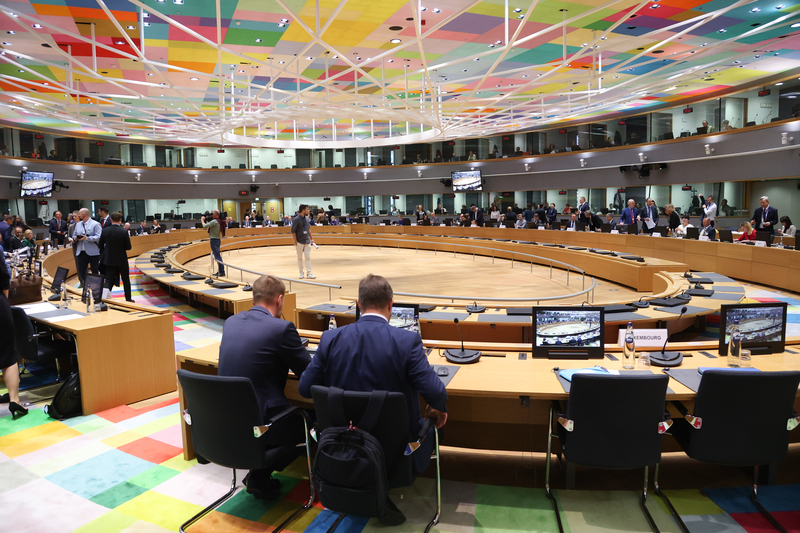
The Council also discussed options for a possible price cap on natural gas. It is of particular importance for Hungary that the idea of a price cap exclusively on Russian imports was not supported by a majority of Member States. However, due to the extremely high gas prices, it is expected that – based on the non-paper of the Commission - the ideas of introducing a price cap on imports of pipeline gas, restructuring the TTF exchange and revising the general trading conditions will be brought back to the Energy Council for further consideration. Representing Hungary, Minister Péter Szijjártó said that any price cap would have disastrous consequences for Hungary's security of supply and would therefore be strongly rejected.
As the last item on the agenda, the Council took note of the information provided by Denmark on the causes of the gas leaks detected on the Nord Stream 1 and 2 pipelines. It said that, on the basis of the information available, the damage to the pipelines was caused by explosions, which in turn indicates that the damage was deliberate. On behalf of Hungary, Péter Szijjártó expressed solidarity with the concerned Member States and expressed his worry about the unprecedented incident.
Without trust the European Health Dataspace will not be operational
In cooperation with Sciensano (Belgium) and the Health Data Hub (France) a workshop on citizens’ engagement in digital health was held the at the Hungarian Permanent Representation on 11 October 2022. The hybrid event was attended by 60 participants while another 100 participants followed it online.
In his opening address, Gábor Baranyai deputy permanent representative underlined that the Hungarian authorities attach great importance to the Commissions’ proposal on creating a European Health Data Space (EHDS). The discussions in the Council are ongoing and they already show that we are pioneering a regulatory field that is unknown for many aspects. It is already clear that if we want a good big health data-ecosystem, the trust should prevail. Without trust especially on the side of citizens, EHDS will never be operational and it will never deliver. That is why Hungary considers it important, and therefore participate actively in the secondary-use focused TEHDAS Joint Action and its “iCITIZENS” working package.
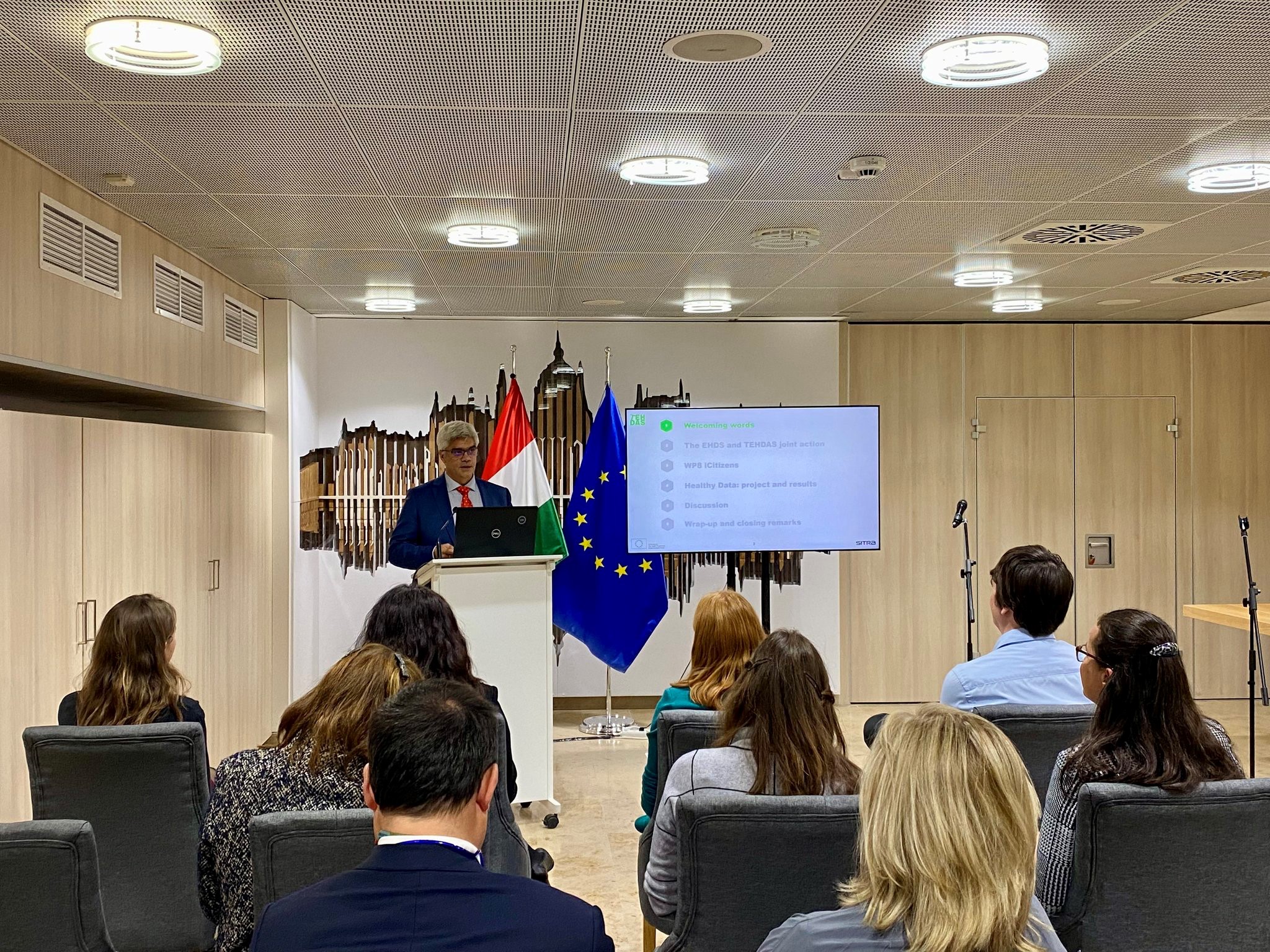
The Worhksop helped to work out good recommendations on citizens’ sensitization and engagement in secondary use of data. The next phase of the work that coordinated by the Hungarian Health Care Directorate and Semmelweis University will establish recommendations on data altruism.
EU Finance and Economy Ministers have met again
At the Ecofin meeting on October 4, ministers reached a general approach on the Commission's REPowerEU proposal, which provides the opportunity to finance investments and reforms that help diversify the energy supply and reduce dependence on Russian fossil fuels. Based on the accepted proposal, Hungary can receive 3.5% of EUR 20 billion, which represents EUR 700 million in grant.
The assessment of the current economic situation was given a prominent role on the agenda. In this context, the ministers exchanged views on the effects of the war and sanctions, then examined the impact of high energy prices on the financial markets.
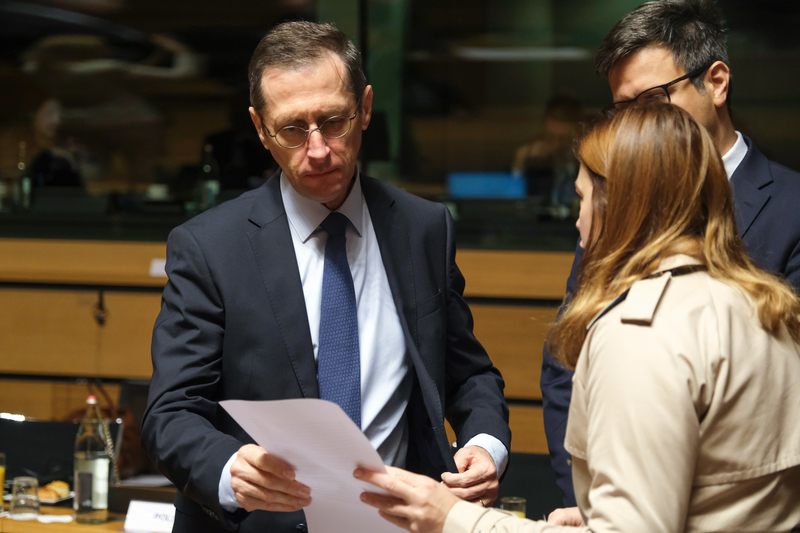
After a very long time, cooperation in the field of customs appeared again on the Ecofin's agenda. Ministers discussed how to balance the financial and non-financial responsibilities of customs authorities.
Ministers reviewed the state of implementation of the Recovery and Resilience Facility (RRF) and approved the recovery plan of the Netherlands.
Agrimarkets-trade were in the main focus at the Agrifish Council in October
Agriculture ministers exchanged views on maintaining phytosanitary and veterinary control systems, agrimarket and agritrade on the 17th of October in Luxembourg.
At the initiative of Austria and Hungary, agriculture ministers of twenty-three Member States expressed their particular concern about the planned reduction of EU co-financing of animal and plant health programs. The ministers emphasized that maintaining health statuses at a high level is of fundamental importance for the unity of the internal market, consumer protection, the achievement of sustainability goals and the competitiveness of European producers.
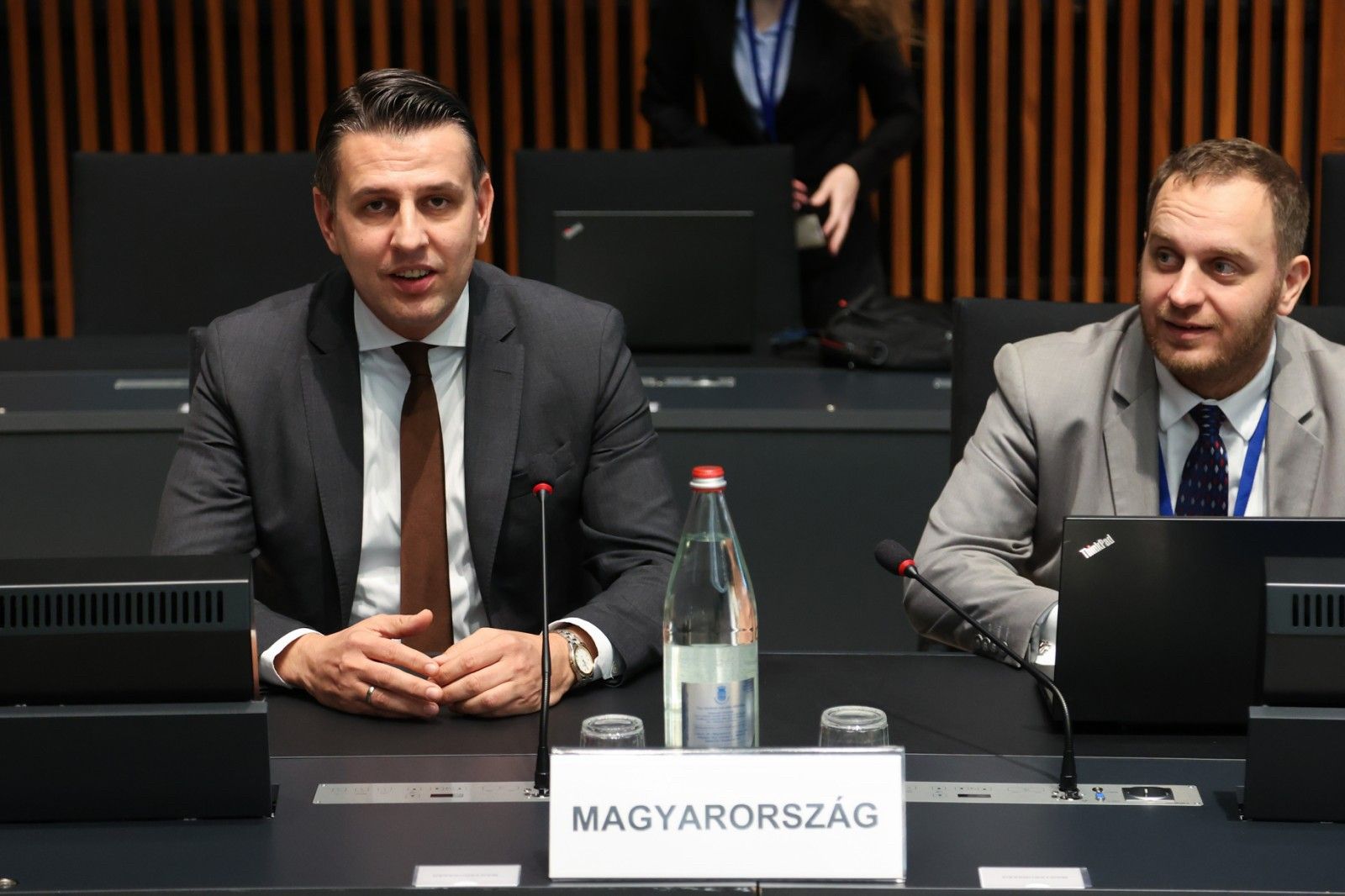
Regarding the market situation, Ministers highlighted the challenges of the instable situation, the increased production and input costs. On behalf of Hungary, Mr. Péter Benkő SCA Spokesperson echoed those Member States, who urged further, extraordinary support for agricultural businesses to reduce the impact of the unprecedented increase in energy costs. Referring the dramatic increasement of energy and fertilizer prices, the Commission announced a Communication on Fertilizers, which is planned to be published on 9th of November.
